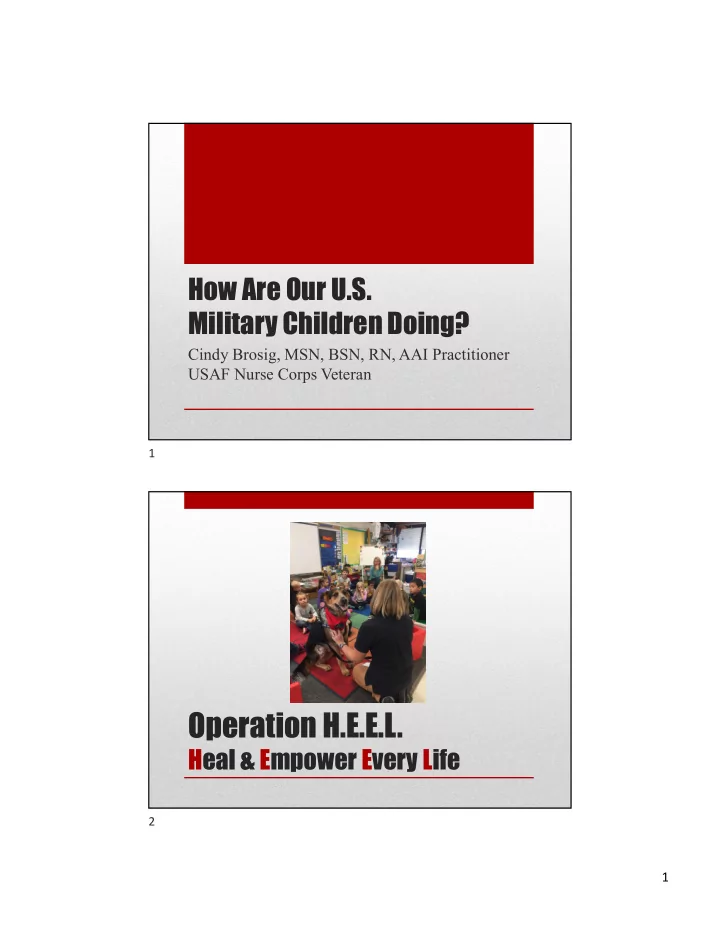

How Are Our U.S. Military Children Doing? Cindy Brosig, MSN, BSN, RN, AAI Practitioner USAF Nurse Corps Veteran 1 Operation H.E.E.L. Heal & Empower Every Life 2 1
The Mission 3 • Become familiar with the U.S. military family lifestyle • Assess the current health & wellness of U.S. Military Children • Use learning tools & resources specifically developed for our U.S. Military Children Objectives 4 2
The Intel 5 U.S. Service Branch Mission Differences 6 3
Military Family Members 7 The Reconnaissance 8 4
Stages of Deployment 9 The “Real” Stages of Deployment 10 5
• Family planning • Anticipation/stress builds • Physical & mental distancing Stage 1: Pre-Deployment 11 • Disorganized, overwhelmed, the uncertainty • Mixed emotions • Security & safety concerns Stage 2: Deployment 12 6
• The “New Normal” • Support system established • “We Got This!” Stage 3: Sustainment 13 • The “Home Stretch” • Nervous energy • Mixed emotions Step 4: Re-Deployment 14 7
• The “Honeymoon” • Shuffling of family duties--power struggles • Need for space Stage 5: Post-Deployment 15 Target Area of Interest 16 8
• 15.2% increase yearly in mental health conditions • 20% increase per year in suicidal ideation • 3% annual increase in psychiatric medication Rx Mental Health Status 17 • #1 Anxiety (3yrs-5yrs) • #1 Behavioral (6yrs- 10yrs) • #1 Depression (11yrs- 17yrs) • 1/3 of school aged kids exhibit psychosocial behaviors Effects of Deployment 18 9
• 40% of MF do not feel a sense of belonging to community • 50% of MF feel there are no resources designed for them • 46% of MF feel civilians have limited awareness, understanding, support, or respect for MF Military in the Community 19 The Conflict 20 10
• Take on fear/worry/anger from parent/guardian • Fear of asking hard questions “Will they come home?” • Feelings of abandonment • Absorb adult responsibilities Military Child Life Stressors 21 • Lack of peer support and/or mentoring • Political target • U.S. service member public image • Inability to share their support/concern for their military family member Schooling Challenges 22 11
Mission Support 23 • MIC3 • Military Interstate Children’s Compact Commission • Vet Center (5 in WI) • WI National Guard Family Support • USO • VFW Local Military Support Programs 24 12
• Purple Up Camps • Military OneSource • Blue Star Families • Yellow Ribbon Event National Military Programs 25 • Ask about their U.S. military family member • Provide forums for military children to share with peers • Military story books Activities to Support Our Military Kids 26 13
Debrief 27 • Not all U.S. service members have PTSD • Document military status of children • School enrollment • Medical records • Communicate often Additional Considerations 28 14
• Resilient • Hardworking • Trustworthy • Compassionate • Helpful • Caring Military Child Strengths 29 Mission Complete 30 15
Thank you & Be Well 31 32 16
Recommend
More recommend